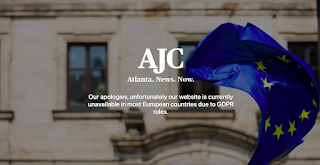
Since I made it to every country in Europe, many people have asked me if my new goal is to see every country in Asia or Africa. The short answer is "no", but there is a bit more to it. Whilst I have
been to every county in Europe, I for sure haven't seen everything. Heck, I still manage to see new things here in Brno so I'm not going anywhere anytime soon. With that being said, I am excited about
my July trip to
Johannesburg and
Cape Town. I've been on
day trips to Morocco and Egypt, but to me this will be my first real trip to Africa. Here's a bit about it.
 Africa is huge!!
Africa is huge!! It's the second largest continent, both in size and population. It's home to more than 1.2 Billion people. Africa has 30,370,000 km² (11,730,000 sq miles).

Within its borders it could basically fit
Belgium,
Netherlands, Spain,
Germany,
Switzerland,
Italy, Eastern Europe, India, China, Japan, the USA, and the
UK.
There's a lot of diversity in Africa. Starting with the 54 independent countries.
North Africa - Algeria,
Egypt, Libya,
Morocco, South Sudan, Sudan, and Tunisia. Western Sahara is disputed territory. Many people include parts of Northern Africa as the
Middle East.

West Africa - Benin, Burkina Faso, Cape Verde, Ivory Coast, The Gambia, Ghana, Guinea, Guinea-Bissau, Liberia, Mali, Mauritania, Niger, Nigeria, Senegal, Sierra Leone, Togo. Saint Helena is a British dependency.
Central Africa - Angola, Cameroon, Central African Republic, Chad, Republic of the Congo, the Democratic Republic of the Congo, Equatorial Guinea, Gabon, Sāo Tomé and Principe.
East Africa - Burundi, Comoros, Djibouti, Eritrea, Ethiopia, Kenya, Madagascar, Malawi, Mauritius, Mozambique, Rwanda, Seychelles, Somalia, Tanzania, Uganda, Zambia, Zimbabwe. Réunion and Mayotte are
French dependencies. Eastern Africa is widely accepted as the place of human origin.
Southern Africa - Botswana, Lesotho, Namibia,
South Africa, Swaziland.
While the continent if rich in natural resources, it is the poorest and most underdeveloped continent. Of the world's 28 poorest countries, 23 of them are in Africa.
In the 19th century, European powers scrambled to lay claim to parts of Africa and established colonies. Here's a film clip from
Uganda Rising that I found on YouTube that briefly talks about the European colonies in Africa.
Following the end of WWII, with European power weakened, most colonial powers starting gaining formal independence.
©Test Tube News
The cities of Ceuta and Melillla are Spanish exclaves in North Africa so they belong to
Spain. The Plazas de Soberanía are small islands off the coast of Morocco that also belong to Spain. Off the northwest coast of Africa is Madeira, an archipelago that is an autonomous region of
Portugal, and
the Canary Islands, an archipelago belonging to Spain.

There are more than 1000 languages spoken in Africa. Almost every country has a European language as an official language with English and French being the most popular. Portuguese is official in six countries.
Islam is the largest religion in Africa followed by Christianity and traditional beliefs.
Africa is not a great place to be gay. Homosexuality is against the law in 34 countries. Being gay in Uganda, Tanzania, and Sierra Leone can result in imprisonment for life. The death penalty is in place in Sudan, southern Somalia and northern Nigeria. The exception is South Africa which was the first country in the world to protect sexual orientation in its constitution. South Africa, the Spanish and French territories all permit
same-sex marriage.
You can't talk about Africa without considering the impact of slavery on the continent. Between the 7th and 20th centuries, the Arab slave traders took 18 million slaves Africa. Between the 15th and 19th centuries, between 7 to 12 million slaves were taken to the the Caribbean, North and South America during the Atlantic slave trade.
The continent has its share of current problems including authoritarian governments, political instability, corruption, armed conflicts, human rights violations, illiteracy and high levels of HIV/AIDS.
©Al Jazeera
Africa is home to just over 15% of the world's population. Yet, more than two-thirds of the world's HIV/AIDS cases are in here. Over 15 million people have died which has left many orphans and quite a young population.
 |
Prevalence of HIV/AIDS in Africa, total (% of population ages 15–49), in 2011 ( World Bank)
over 15%
5-15%
2-5%
1-2%
0.5-1%
0.1-0.5%
not available
|
|
The African Union is their version of the
European Union. Except that every African country is a member of the AU.
©Test Tube News
Many believe that Africa is the future of economic growth. Over the past years
China has invested lots of money and today it is Africa's largest trading partner. Ghana, Ethiopia, Ivory Coast, Djibouti, Senegal, and Tanzania, are among the world's fastest growing economies.
Update 2025: Here's a short video about why the
Russian Empire never scrambled to colonise Africa like other European powers.
©History Matters
 It's been a few years but I made it back to Slovenia. I had two days of meetings in Ljubljana so an early flight on Sunday provided an opportunity to revisit this beautiful city.
It's been a few years but I made it back to Slovenia. I had two days of meetings in Ljubljana so an early flight on Sunday provided an opportunity to revisit this beautiful city.
 Ljubljana is a really nice place to visit. I can't believe that it's been seven years since I was last there. I definitely won't let so much time go by before my next visit.
Ljubljana is a really nice place to visit. I can't believe that it's been seven years since I was last there. I definitely won't let so much time go by before my next visit.


























































